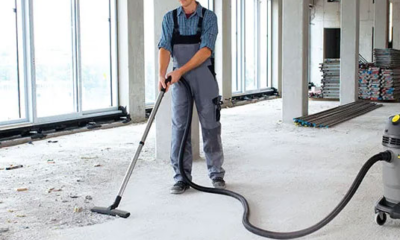Health
What Is Preventive Care and Why Is It Important for Elderly People?
Published
1 year agoon
By
Abdus Subhan
As we grow older, our health needs change. Being proactive about health becomes increasingly important to maintain quality of life and independence in our later years. Preventive care plays a pivotal role in this. In this article, let’s see what preventive care is and why it is important for elderly people.
What Is Preventive Care?
Preventive care refers to routine healthcare aimed at disease prevention and early detection. It involves regular check-ups, screenings, immunizations, counseling, and medications meant to prevent illnesses, detect issues at early stages, and maintain optimal health.
Finding a primary care doctor is often the first step in establishing a preventive care routine.
Unlike diagnostic and treatment services, which address existing health problems, preventive care focuses on preempting diseases before they develop. It equips us to get ahead of avoidable health issues.
Why Is Preventive Care Crucial for the Elderly?
With age comes an increased risk for various health conditions like heart disease, cancer, diabetes, osteoporosis, arthritis, dementia, and more. Life expectancy at 65 years is 18.4 years for both sexes, with men at 17.0 years and women at 19.7 years.This longevity underscores the necessity of preventive care. By being vigilant and proactive, seniors can add healthy years to their lifespan.
Here are some key reasons preventive care is vital:
1. Allows Early Detection of Health Issues
Many dangerous conditions, like glaucoma, hypertension, cancers, hearing loss, etc., do not have obvious symptoms initially. Regular screening and tests facilitate early diagnosis when treatment is more effective. This improves health outcomes.
2. Better Disease Management
Preventive care promotes adherence to prescription drugs and lifestyle changes needed to control existing illnesses like diabetes and heart disease. This prevents complications.

Many seniors live with chronic illnesses like diabetes, COPD, heart disease, arthritis, and hypertension. Preventive care promotes adherence to medications, lifestyle changes, and ongoing monitoring needed to control these diseases optimally. This helps prevent acute complications that can arise when illnesses are poorly managed.
For example, people with diabetes who regularly check blood sugar levels, take medications as prescribed, follow dietary guidelines, exercise, and get foot and eye exams are better able to regulate blood glucose and avoid problems like vision loss, kidney failure, nerve damage, and amputations. Likewise, hypertensive patients who monitor blood pressure, limit sodium, take anti-hypertensives, and get regular check-ups can lower the risks of heart attack, stroke, and heart failure.
Ongoing preventive care allows health providers to assess how well seniors are self-managing illnesses and identify any issues early on before they become severe. This approach prevents complications, enabling better disease control.
3. Maintains Quality of Life
Being proactive preserves physical and mental functioning. This allows seniors to remain independent and enjoy activities longer.
Preventive services enhance early detection and treatment of health issues. This preserves seniors’ stamina, mobility, strength, cognition, mental health, and overall well-being.
Remaining physically and mentally fit allows older adults to maintain independence longer and safely perform daily activities required for self-care – like bathing, dressing, and cooking. It also enables seniors to enjoy leisure pastimes, hobbies, and social connections that add enrichment and meaning to life.
Unidentified or poorly controlled health problems can accelerate functional decline without preventive vigilance. Seniors may lose abilities needed for self-care, forcing over-reliance on others. Give up treasured activities and social interactions. Require earlier transition into assisted living or nursing facilities.
However, being proactive fortifies both physical and mental functioning. This sustains independence and allows seniors to remain actively engaged in fulfilling pursuits they find enjoyable, meaningful, or purposeful. Thereby promoting quality of life in later years.
4. Reduces Healthcare Costs
Detecting and treating diseases early on costs less compared to emergency care later. This makes preventive services a cost-effective investment.
Key Preventive Care Services for Seniors
The American Academy of Family Physicians recommends the following screenings and immunizations for elderly patients:
1. Monitoring Vitals
- Blood Pressure: Should be checked annually. Among noninstitutionalized persons, [66.7% of men aged 65-74 and 81.5% of men aged 75 and over have hypertension. For women, the percentages are 74.3% for ages 65-74 and 86.0% for ages 75 and over. Uncontrolled high BP increases stroke, heart attack, and kidney failure risks.
- Cholesterol: Measuring total cholesterol, LDL, HDL, and triglycerides every five years. Obesity, a risk factor for high cholesterol, affects 41.9% of men aged 65-74 and 45.9% of women in the same age group. High cholesterol furthers cardiovascular disease progression.
- Blood Glucose: Screening for type 2 diabetes every three years. Monitoring glucose is vital for diabetes management.
- Body Mass Index (BMI): Assessing BMI annually to identify obesity. Excess weight compounds health problems. Losing weight, if required, reduces risks.
2. Cancer Screenings
- Colon Cancer: Colonoscopies every ten years to detect colon polyps and cancer. Removing polyps prevents cancer.
- Breast Cancer: Annual mammograms for women to find tumors. Early detection via mammograms cuts mortality risk by 40%.
- Cervical Cancer: Pap tests every 3-5 years for women with cervixes. Prevents cancer through early abnormality detection.
- Lung Cancer: Annual low-dose CT for high-risk, long-term smokers. Improves survival chances when tumors are small.
- Prostate Cancer: PSA blood test and digital rectal exam for men. Controversial but may detect cancer before symptoms arise.
3. Immunizations
- Influenza Vaccine: Annual flu shots reduce hospitalization likelihood by 50-60%.
- Pneumococcal Vaccines: Prevents pneumonia and meningitis. PCV13 and PPSV23 given at age 65.
- Td/Tdap Vaccines: Tdap vaccine once, then Td booster every ten years to prevent tetanus, diphtheria, and pertussis.
- Shingles Vaccine: Shingrix given at age 50+ even if one had shingles before. Prevents painful shingles and nerve pain complications.
4. Other Tests
- Eye Exam: Annual eye screening to check for glaucoma, cataracts, and macular degeneration. Prevents vision loss.
- Hearing Test: Regular hearing checks for age-related hearing loss. Aids early intervention.
- Bone Density Scan: Assesses fracture risk and monitors osteoporosis. Helps prevent broken bones.
- Skin Exam: Annual skin cancer screening. Early treatment prevents the deadliest forms.
Individualizing Preventive Care
While these guidelines provide a general framework, specific tests should be tailored to one’s medical history, family history, risk factors, and conditions. A physician can recommend a personalized schedule for optimal preventive care.
Accessing Preventive Services
Many preventive services like cancer screenings, vaccines, vital measurements, and annual wellness visits are covered 100% by Medicare and private insurers under the Affordable Care Act.
Out-of-pocket costs can be incurred for procedures like colonoscopies. But these are waived if polyps are discovered. Seniors must review plans carefully and consult doctors to utilize covered services fully.
Key Takeaways
Maintaining wellness in older age requires diligence. Minor health concerns left unaddressed can escalate over time. However, preventive care allows seniors to get ahead of avoidable diseases, preserving health and quality of life.
By being proactive, older adults can continue doing what they love in their golden years!
Recent News


Instagram Story Viewer: Shaping Social Media!
Could you think of Instagram without stories? Even though Instagram Stories were introduced not so long ago, in 2016, they...


Top Benefits of Using a Phone Appending Platform for Batch Data Updates
In the world of data-driven marketing, having access to accurate and current contact information is essential for successful customer outreach....


3 Tips for Dressing Perfectly for Special Occasions
Dressing for special occasions can sometimes be a stressful and overwhelming process, especially for women. Whether you’re attending a wedding,...


Maximise Your Hunting Success with Dive Bomb Industries Decoys
When it comes to hunting, there’s no such thing as too much preparation. Hunters understand that the right equipment can...


Castle App Free Download — Updated 2024 Version
What is Castle App? Castle App, a stream app developed for streaming media content, makes entertainment effortless by giving clients...


How to get a duplicate RC book for your vehicle: A step-by-step guide
If you have lost or damaged your vehicle’s registration certificate, you must be tense and under stress. But getting a...


Enhancing Property Value Through Professional Builders Cleaning Services in the UK
Construction and renovation projects make a ton of residue, garbage, and soil, passing on a requirement for proficient cleaning to...


Saturn in Sidereal Pisces-March 28,2024 to February 21st 2028 by Jade Luna
I really wanted a female president governing this cycle but the chart of America would choose the hardest path, not...


Top 5 Super Clone Rolex for Women
Super clone Rolex watches are incredibly detailed knock-offs of popular Rolex models, crafted to look and feel just like the...


Transforming Dreams into Reality: A Success Story of Purchase Amazon Seller Account
Purchase Amazon Seller Account: In the fast-paced world of e-commerce, many aspiring entrepreneurs dream of starting their own business. However,...
